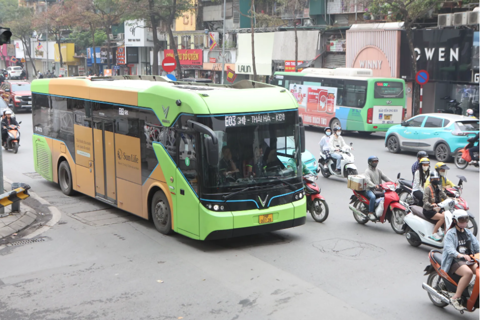Stricter punishments needed to manage food safety in Hanoi
Officials and experts believe that imposing stricter fines will be effective in managing food safety, ensuring access to safe, high-quality products, and protecting public health.
Enforcement in food safety (FS) regulations has not been thorough enough over the past years in Vietnam, evoking many violations that led to food poisoning incidents in various locations.
To improve FS management, it’s necessary to have new penalty regulations and strengthen the role of government agencies in FS inspection and supervision, according to Hanoi's authorities.
| A food safety inspection team of Hanoi at a supermarket in the city. Photos: Tran Thao/The Hanoi Times |
Monitoring food poisoning risks
For the suspected mass food poisoning case involving bread in Vung Tau City, the Ba Ria - Vung Tau’s Department of Health reported that tests on the input foods at the "Co Ba Ben Dinh" bread and sticky rice shop (6 Nguyen An Ninh Street, Ward 7, Vung Tau City) found Salmonella contamination.
The test results showed that samples of boiled pork, pork pate, Vietnamese pork sausage, pork sauce, and raw vegetables in the bread did not meet the national technical standards for microbial contamination (containing Salmonella) in foods.
Salmonella bacteria enter the body through the digestive tract, survive the acidic environment of the stomach, reach the small intestine, and adhere to the intestinal lining via adhesion proteins. The bacteria then invade the intestinal lining cells, causing cell damage and inflammation.
When infected with Salmonella, individuals often experience diarrhea, fever, and stomach cramps, and may also suffer from headaches, nausea, and vomiting. Symptoms typically begin 6 hours to 6 days after bacterial infection and last 4 to 7 days. Most people recover within a week, but sometimes the infection can spread to the blood, bones, joints, brain, or nervous system, causing longer-lasting symptoms.
The cases were reported in Vung Tau City when hundreds of residents were hospitalized with symptoms such as stomach pain, vomiting, diarrhea, and dizziness after eating bread from the "Co Ba Ben Dinh" bread and sticky rice shop. Upon inspection, the establishment could not present the necessary documents or proof of the origin of the input food. The shop sourced input food from four bread production facilities and two pork suppliers.
As of November 30, the health surveillance system of Ba Ria - Vung Tau Province recorded 379 patients hospitalized for treatment at Vung Tau Hospital and Vietsovpetro Medical Center due to food poisoning after eating bread in Vung Tau City. Among them, one person, T.V.R. (71 years old, from Vung Tau City), did not survive.
Regarding the issue, the Department of Medical Examination and Treatment Management under the Ministry of Health requested the Department of Health of Ba Ria - Vung Tau Province to concentrate and mobilize skilled physicians, ensure sufficient medication, emergency facilities, and timely treatment for patients. They are also instructed to closely monitor critically ill patients and those at risk of deteriorating, ready for inter-hospital consultations when necessary.
The Food Safety Authority (FSA) under the Ministry of Health therefore urged the Department of Health of Ba Ria - Vung Tau to promptly direct hospitals with ongoing patient treatments to focus all resources on treating patients to prevent adverse effects on their health and lives.
The FSA requested the Department of Health of Ba Ria - Vung Tau to temporarily suspend the operations of the establishment suspected of causing the food poisoning, investigate its compliance with FS regulations, and strictly handle violations while publicizing results to promptly warn the community.
| Hanoi's market inspector checks a bread sample at a local supermarket. |
Ongoing food safety concerns
Since early 2024, several major food poisoning incidents have occurred in various localities, causing many illnesses and hospitalizations, with food poisoning risks still present and causing public concern.
To minimize food poisoning incidents and foodborne illnesses, Hanoi has asked units and localities to implement comprehensive preventive measures and promptly detect food poisoning cases.
The city also called for increasing inter-agency coordination, inspection, and supervision of FS compliance among food production and business establishments. Special attention is given to food groups under the jurisdiction of the industry, with more unannounced inspections.
The city stressed the importance of strictly handling and suspending operations of establishments that fail to meet FS conditions and those without FS certificates. Violations and enforcement results must be publicly disclosed to timely warn producers, businesses, and the community.
Hanoi proposes higher fines
Vu Cao Cuong, Deputy Director of the Hanoi Department of Health, mentioned that to enhance the effectiveness and efficiency of FS management and to implement the Capital Law, the department proposed that the city council approve a resolution to double the fines for certain administrative violations in the FS sector.
The proposed fines for administrative violations under this resolution would be twice the fines specified in existing decrees on administrative penalties in the FS sector. The maximum fine, according to the Capital Law of 2024, would be applied.
Doubling the fines aims to increase deterrence against FS-related violations by organizations and individuals, fostering a healthy business environment.
A safe vegetable production establishment in Hanoi. |
Ensuring effective FS regulations
FS is directly related to public health and safety, and despite existing penalties, they lack sufficient deterrent effects, resulting in complex FS issues.
Experts and scientists believe the proposed resolution is necessary for organizations and businesses to improve FS practices. The proposed fines would serve as a common deterrent within allowable limits.
Pham Ngoc Thao, Chairman of the Democratic and Legal Advisory Council of the Vietnam Fatherland Front Committee in Hanoi, said that implementing the resolution requires addressing various issues, especially in the street food business. To facilitate implementation, the resolution should include an annex, focus on public awareness, and increase the delegation of authority to ward-level governments.
Experts suggest new penalty regulations to better manage FS, alongside practical measures such as enhancing FS education, encouraging public oversight, rewarding individuals who report FS violations, and empowering local authorities to conduct thorough inspections and supervision.
Nguyen Lan Huong, Chairman of the Vietnam Fatherland Front Committee in Hanoi, stressed the need to strengthen the inspection and supervision roles of state FS management agencies. At the same time, she emphasized the importance of public oversight in reporting FS violations to authorities via hotlines.












